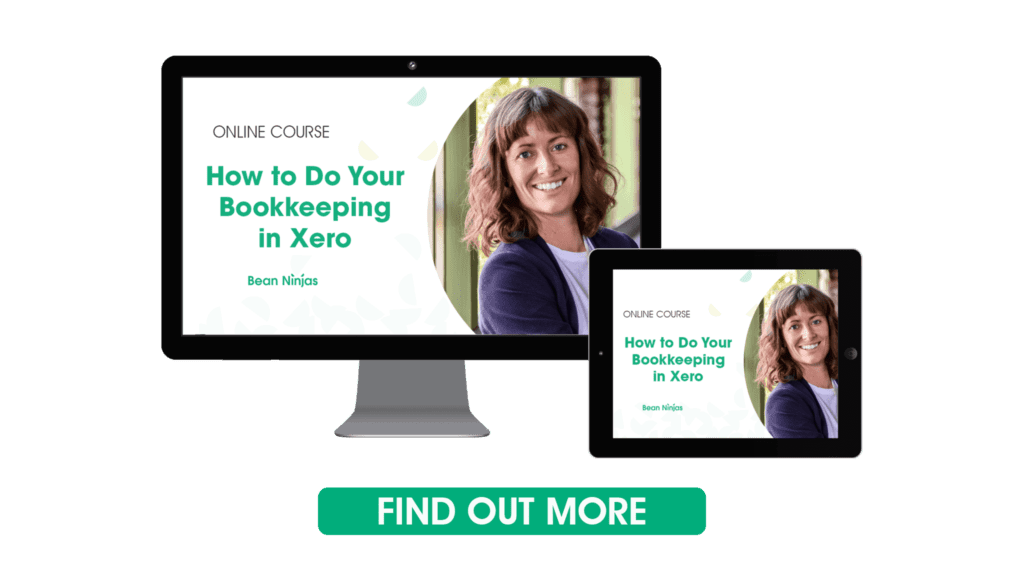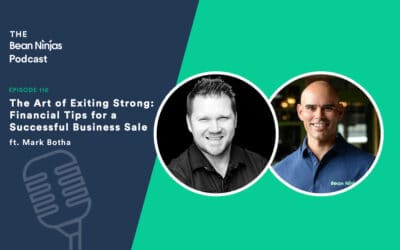
Entrepreneurs Natalie Alaimo and Mel Telecican share their experience building their financial literacy skills using Xero.
Hear about the benefits of learning how to set up Xero effectively and how it can help to grow your small business.
In episode 85 of the Bean Ninjas Podcast, we’ve invited 2 course completers of the Bean Ninjas How to do Bookkeeping Course in Xero.
Natalie Alaimo and Mel Telecican will share their journey and experience with their businesses and building their financial literacy skills.
In this episode, we discuss:
[01:15] Natalie’s introduction on her business.
[02:08] Mel’s introduction on her business.
[02:47] Challenges business owners face when it comes to their business finances.
[04:15] Natalie shares her experience with business finances before doing the Bean Ninjas Xero training.
[04:49] Mel shares her experience with business finances before doing the Bean Ninjas Xero training.
[05:55] Meryl’s recommendations to small business owners who feel the same challenges as Mel and Natalie on their business finances.
[08:44] The results Natalie got after taking the training.
[09:57] Mel’s results after finishing the course.
[11:12] Why Bean Ninjas developed the How to do Bookkeeping Xero Course
[11:46] Other benefits Natalie got from the course.
[12:51] Other benefits Mel got from the course.
[13:50] Meryl’s experience as the program facilitator.
[15:00] Reasons why Natalie recommends the course.
[16:16] Mel shares her reasons why she recommends the course.
Want to get the chance to work closely with an experienced accountant over 5 weeks to take control of your business finances while learning and implementing Xero in your business? Check out our How to do Bookkeeping in Xero mentorship program. Enrolment closing soon.
Transcription
Meryl Johnston:
In today’s episode, we’re going to be talking about the benefits of learning how to set up Xero effectively and how that can help to grow your small business. So if you run an online business and you want to get a better handle on your finances, then this episode will be helpful to you. I’m going to be sharing my perspective as an accountant, but also my perspective as a small business owner on the importance of financial literacy.
In the episode today, you’ll be hearing from two of our course students; so Natalie and Mel; two students that have completed the Bean Ninjas’ How To Do Bookkeeping Course in Xero. So they’re going to be sharing a little bit about their individual journey with their businesses and also their journey in building their financial literacy skills.
Here’s Natalie sharing a bit about her business.
Natalie Alaimo:
So my name is Natalie Alaimo and I am a digital strategist and marketing coach. And I’ve been working with myself since 2008, creating courses and coaching women on how to get more from their marketing.
Basically, I started using Facebook in 2007 to market; at the time, we had a family printing business, and our customers just started asking me what I was doing. So I was then invited to speak in a conference in Cayle, and that was really the beginning of my business.
So within a few weeks, I had sold out a face-to-face workshop and the rest is history. Over the years, the business has evolved, as of course, have I, and obviously, the market as well. And now, I love creating the spoke marketing strategies for women who are ready to trash the ‘should do’s and tap into what they want to out of marketing their business.
Meryl Johnston:
And now, here’s Mel talking about her business.
Mel Telecican:
Basically, Loyalest is a business I started back in 2014; it’s my second business, but the first, in the digital marketing, content marketing space. And essentially, what do we do? We help businesses get and keep more customers or clients.
And even though we started back in 2014, these days, for the last few years, we’ve been solely focused on professional services, and we work with accounting firms, law firms; a lot of law firms, engineering and architectural firms, and we essentially help them learn how to leverage their already good reputation and scale it for those that are more prominent in the market and get more of the market share, essentially.
Meryl Johnston:
Let’s chat about some of the challenges that business owners face when it comes to their business finances. In my experience in working with many small businesses over the last ten years, they can typically be boiled down to two main things.
The first thing is not having accurate records, and therefore, not being able to rely on the business models. And I hear comments like, “I’m not sure whether the profit figure in Xero is right,” or “I’ve got my statement in June,” but actually, it is actually November. And the issue here is related to not having a financial system that is working for the business owner. The other component of this is someone that does have accurate records, but they don’t have the confidence or the skills to make data-driven decisions.
So just to recap that, the two scenarios are one, that there’s not accurate records, and therefore, we can’t even attempt to make good decisions. And the second is that there are accurate records, but the business owner doesn’t have the confidence or doesn’t have the skills to use that information to make good decisions.
So in the second case, there are accurate records but not the financial literacy skills, this is where I hear comments like, “I’m not really numbers person,” or “My bookkeeper sends me reports every month, but I’m not really sure what I’m supposed to be looking at in their reports.” And this is a financial literacy skills or a ‘know your numbers’ skill issue.
Next up, we’ve got Natalie here sharing how she was feeling about her business finances before doing the Bean Ninjas’ Xero training.
Natalie Alaimo:
So before I started the course, my feelings about business finances honestly, I had my head in the sand about the financial side of our business for years. It wasn’t great. I’m awesome at the marketing side; I love counting sales, but not so good at the tracking of the expenses and the cash flows. And to be honest, I have really not a lot of idea what was going on.
Meryl Johnston:
And now, we’re going to hear from Mel on the same topic.
Mel Telecican:
You and I have talked about this before. But my answer is not bad, but not great at all. So I tell the story more recently just this year because of my new-found finances focus that somewhere back in high school, when I was doing accounting, in business principles accounting at least, I must have lost a step in the process. And for some reason, ended up losing momentum in terms of understanding some of those fundamentals there.
And so, I ended up, I guess putting myself into the category of being not a numbers person; more of a literacy-focused person because I had so much success there and didn’t seem to have any gaps and understanding. So that really shaped, I think, who I am, or as a young adult at least, in early business.
I was always aware of it that I wasn’t over things enough. And so, it wasn’t catastrophic for me, but it was definitely not helpful in terms of projecting things into the future. So not confident, not clear, not sure about where things were necessarily headed from the strategy perspective with an ease of certainty.
Meryl Johnston:
Perhaps you can relate to some of these situations and I think it’s important here to not feel like you’re alone. So if you’re experiencing any of these common challenges, then here’s what I typically recommend to small business owners to feel like you’re taking control when it comes to business finances.
Number one; get started with Xero. Using a professional platform accounting tool as opposed to a spreadsheet really helps with this.
Number two; make sure that you’re getting paid. Make sure your customers are paying you and that you’ve got a process around how to do this.
Number three; pay your bills and expenses regularly. This helps with relationships with your suppliers, but also, if you’re on top of bills and expenses and money that’s coming out of the business, then you’re more likely to have a better handle on cash flow.
Number four is do your books regularly. The example I gave earlier was looking at your June figures in November, and that’s far too late. You really want to be looking at those numbers sooner after the end of the month. So if the month of June had just passed, then in early July, you want to be having a look at the reports; the financial statements for that month. Having a bookkeeping timetable and knowing who needs to do what by when in order to get those reports out soon after the end of each month really helps with that.
And then, number five is ongoing improvement. Running your finances, your business finances, is just like any other area of your business, and you might not have it running perfectly from day one. I like to take an approach of incremental improvement with finances as I do with other parts of business.
And I, again, address and implement what’s going to have the biggest impact early on and get this system set up. But then, it’s not a set and forget kind of things. There’s a lot of smaller areas or smaller changes and improvements that you can make over time.
For example, you might get started with Xero and then down the track, you might look at something another time-consuming part of bookkeeping to bring in another Xero add-on to help automate that. Or you might decide, “Yup, the reports are getting; they’re pretty good,” but now, you want to drill down and get some more detailed reporting, start looking at right shares.
And you can’t do that if you haven’t got the foundations, right? And that’s where I recommend doing that first and then looking to gradually improve both how you’re doing things and also, your knowledge around your own business finances.
The five points that I went through there are the steps that we take students through as part of the course, and there are some other components of the course as well. And we found that when these steps are implemented, our students do the work, then it really does achieve great results.
Next, we’ve got Natalie talking about what happened in her business as a result of taking these steps.
Natalie Alaimo:
It wasn’t then until I found Bean Ninjas. I think I started on the free challenge and reading your blogs, and then, we did the course. And that’s really when I started to get some involvement in that side of the business. Since then, we’ve set up Xero, we’re up-to-date with our buzz, we have a GST saving account, a cash flow forecast, and we are working on getting regular bookkeeping systems in place. So I’m in business with my mom and we both got a better snapshot of really the financial side of the business, not just the stuff that we excel at the marketing side.
Meryl Johnston:
I love the school holidays example, Natalie. The fact that you had moved to Xero, which enabled you to see who you owed money to, and then also, you put time into creating the cash flow forecast so you could project into the future, project six months ahead and see what was coming up for the business.
And in doing that, it gave you the knowledge and the confidence that it was okay to take time off over the school holidays, during the Christmas period, knowing that cash flow was going to be fine. I love that example.
And now, here’s what Mel experienced.
Mel Telecican:
Right. So I never understood the concept of accountants; so people who really own their numbers when they would say that numbers can be sexy. And I sort of shove it a little bit and go, “No, not even a little bit.” But I do remember saying to you after I’ve finished the course, I totally get it now. Like, I get it, I’m excited and I can see the opportunities.
So I think that’s the biggest thing. And from there, I guess that further solidified what I had thought I would be wanting to do this year was to go, “Okay. I really want to become; I am going to become a numbers person.” And so, that really solidified that for me. So yeah, it looks good; the next three or four months are looking good, and there’s definitely that clarity in place that wasn’t really there beforehand.
Mel, a self-declared non-numbers person has had some big wins from the course.
Meryl Johnston:
Thanks for sharing that Mel. And it makes me really happy when I hear business owners who are actually enjoying their numbers. I enjoy numbers, and that’s probably why I went into accounting. And I know that a lot of business owners don’t and actually have some blocks around digging into accounting and finances. So when I hear that someone is actually finding it fun or exciting, that makes me feel really happy.
So why did we create the How To Do Your Bookkeeping in Xero Course? So it really comes back to helping business owners like Mel and Natalie achieve results like that. Then it also ties in with a bigger Bean Ninjas mission and big hairy audacious goal. So our big hairy audacious goal now is to ‘Educate and support 10,000 entrepreneurs to know their numbers and make data-driven decisions in order to achieve true freedom.’
So a course like this provides other benefits, too. And here is Natalie sharing some of the other benefits that she got out of the course.
Natalie Alaimo:
The biggest thing that we got from the course, I would say, is really the confidence to move to Xero. So we had an old, outdated computer-based version of Myob, and it was so old; like it was on my mom’s two or three computers ago from the one that she was currently using, which basically meant it worked in a silo by itself.
Now, we have a Xero file that’s a 100% set up, and we can really quickly, and it’s really easy to use. Like, I think people think that accounting software can be complicated, but we can quickly see who owes us money, money that we owe, and really completing the buzzes and bank reqs like as simple ones you’ll, of course, know-how.
So just having that snapshot has probably been the biggest thing. Plus some of the other things I mentioned like we’ve made a point of putting GST and PAYG tax in a separate account. We’ve done our cash flows, a forecast for six months or so, and really just making sure that we’re staying on top of it so that we do keep that solid snapshot of what we’re doing financially in the business.
Meryl Johnston:
And now, here’s Mel.
Mel Telecican:
So I found myself going back to sections of the course as I’ve discovered that I’ve got a gap in understanding. Or for instance, I’m still getting probably into the routine and the habit of moving around the [Inaudible 00:13:06]. And so, for me, it’s actually the ability to go back and revisit those sections and to be able to draw the notes around it to sort of fill those gaps and then to be able to move forward.
So I’d say that’s the biggest piece of gold for me now. And I think also, too, knowing that everything is up-to-date and there’s not these big long periods of time now that we have things in the back end of Xero looking a little bit busy, let’s say.
And so now, things are up-to-date. It’s clearer and we’re getting paid on time because everything’s organized with what the schedule in play. I think that was the biggest thing is having the bookkeeper’s timetable in play so that those things have been crossed off daily, weekly, fortnightly, monthly. So, good.
Meryl Johnston:
I wanted to quickly touch on what my experience as a facilitator for the program. We’ve run the program three times now; we ran that during 2019 and I had the opportunity to learn as well as the facilitator. We had a regular group calls each time we ran the program. It was really interesting seeing the questions that came through, seeing some of the things, which I’ve talked about already around confidence and also the benefits of learning alongside other business owners at similar stage.
And I enjoyed getting those questions and some of them were similar, but always some unique questions as well in each of the cohort, which I then use to go back and improve the course content.
And for me, the thing that I enjoyed the most was just seeing the confidence that was built around the business owners, feeling like they were becoming numbers people and actually starting to enjoy the finances rather than it being something that they were putting their head in the sand about.
We’ve also asked Natalie and Mel why they would recommend the course, and here’s what they had to say. So first off, here’s Natalie.
Natalie Alaimo:
Definitely. I think that when we start a business, or when we get into business for our self, the fun stuff is the social media set up, and branding, and, “What colours are we going to have?” And, “Should I do Facebook lives or should I do Instagram?”
But the last blood of your business, apart from obviously, getting clients; and I was speaking to a lot of people about they’re really good at getting the money in; they’re not so good at keeping the money, is that if we don’t track our financial side, it’s really easy for it to slip away from us and you can potentially market yourself out of a profit or out of a business.
And I think in terms of even business and life, money, it’s something that we all need and it can cause issues in businesses and relationships and all of those things. So by having an understanding of how it all works, which what the course teaches you to do and putting those simple systems in place, it just makes the rest of what you’re doing a lot easier.
It allows you to make better-informed decisions that allows you to have a better relationship with business partners or in your personal relationships because you’re not stressing about that constant stuff as well.
Meryl Johnston:
And now, here’s Mel.
Mel Telecican:
Yeah, absolutely. I think the biggest thing for me is being, past tense, none numbers person with the detail and the explanation. So all of the tutorials are really clear, and if there are any words that come up or phrases, or I guess, even sections of content that come up that are referred to; everything is really clearly referred back to you.
So terms are broken down and being directed back where to find the other pieces of information and more detailed throughout is definitely helpful. It makes a difference I think because I don’t think that there would be an awful lot of material out there that’s talking at the level of, I guess, the everyday non-accountant person. And this course definitely does that.
Meryl Johnston:
Well, thanks so much ladies. It was really fun working with both of you as well as all of the other students. So if you see yourself in any of these stories, or if you’re somebody who is looking for a plan to take control of your finances and make better business decisions, then I’d like to invite you to become part of the new and improved ‘How To Do Bookkeeping in Xero’ program, and our next enrolment intake closes on the 16th of March.
We’d love to help you overcome the challenges with small business finances, and who knows, maybe you’ll be our next case study or success story on our future podcast episode. So if you’re ready to implement your Xero system with the support of an experienced accounting mentor and alongside, other like-minded business owners, then head over to beanninjas.com/course and there, you can find out more information about the course and you can also enrol from that page as well.






